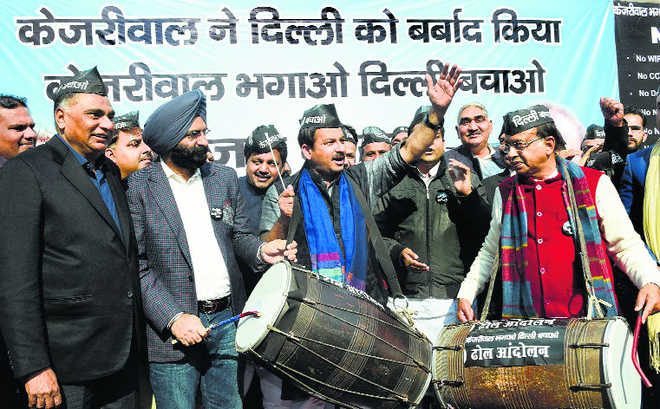
Challenge ahead: Taking on AAP and its popular programmes won’t be easy for a divided BJP.
Vibha Sharma in New Delhi
The BJP is promising a pollution-free Delhi in two years if voted to power and a law on regularising hundreds of unauthorised colonies in the national capital. The Union Cabinet has approved the proposal to grant ownership rights to people living in 1,797 unauthorised colonies — a move estimated to benefit 40 lakh people in the city, while Prime Minister Narendra Modi recently assured a delegation that the legislation will be enacted in the Winter Session of Parliament.
The Delhi Assembly elections are a prestige issue for the BJP, in power at the Centre since 2014. Reports also suggest an edge to the Arvind Kejriwal-led Aam Aadmi Party despite the drubbing at the hands of the saffron party in the 2019 Lok Sabha elections. The newbie, that made its political debut in 2013, still has it in it to give sleepless nights to opponents, it seems.
Read also :
- Performance & populism pitch
- Rainbow leadership aims to fill void left by Dikshit
- 5 yrs in Kejriwal’s Delhi
Issues that could swing votes
The BJP believes the issues of severe air pollution, stressed-out bus service, dilapidated roads and unauthorised colonies can help it unsettle Kejriwal. In the war of words that followed when the national capital turned into a gas chamber post-Diwali, Kejriwal claimed pollution in Delhi was down 25 per cent during his tenure.
However, if the current environmental situation is taken into account, Delhi ranks pretty low in the liveability parameter. The BJP says the city needs 12,000 electric buses to improve the public transport system and keep pollution under check, while Kejriwal counters that he is already on the job — politics over pollution is in full force.
While on basics like bijli-pani, education and health, the Kejriwal government cannot be discredited, the question is: can the promise of clean air, good roads and regularising unauthorised colonies help the BJP overcome the challenge of AAP?
Banking on anti-incumbency
Unlike in Haryana and Maharashtra, in Delhi the BJP does not bear the baggage of anti-incumbency; that burden is on the AAP. The BJP has four MLAs and a “deeply divided state unit” that would have to come together to reverse political trends of the past two decades and AAP’s dedicated voters.
The saffron party has been out of power since 1998 in the capital of the country. It lost Delhi to AAP in 2015 when the Modi magic was at its peak. The leadership believes 2020 is “the right time for a comeback”; after all, the BJP registered a seven on seven in the Lok Sabha polls and also a substantial rise in vote share. Not a single AAP candidate could withstand the saffron storm and the party that rules Delhi ended a dismal third.
At the same time, AAP’s hold at the grassroots cannot be dismissed, like the fact that nationalism and Central schemes that gave the BJP an edge in the General Election are no longer talking points in the face of the serious economic slowdown, job loss and local issues.
Factionalism in the party
Having “learnt the lesson” the hard way in 2015, the BJP is expected to stick to the tested formula of contesting without a chief ministerial face. Projecting Kiran Bedi as the CM against Kejriwal was a bad decision, leaders agree.
But while a Purvanchali, state BJP chief Manoj Tiwari, attempts to end his party’s “vanvas” in the capital, it seems not everyone in the BJP is comfortable with the idea. As the BJP’s ‘Punjabi leadership’ reminiscences about the times when stalwarts like Madan Lal Khurana, Vijay Malhotra and Kidar Nath Sahni commanded Delhi’s political scene, the problems for the party do not end here.
As the “divided state unit” prepares to take on AAP and its popular programmes, there is another challenge — the three municipal corporations of the city that BJP controls, and the charges they face. Local leaders say they have been asked to highlight the work of the Modi government but the three local bodies (North Delhi Municipal Corporation, South Delhi MC and East Delhi MC) are facing public hostility over drains, garbage and unauthorised construction. Besides the “goodwill” generated by upgraded government schools and ‘Mohalla clinics’, the BJP also has to deal with AAP freebies like free travel for women and zero electricity bills.
As Delhi gasps for breath some weeks away from the elections, the AAP, which still holds 66 of Delhi’s 70 seats, has a lot to answer for.
When AAP trounced BJP
When AAP made its electoral debut in 2013, the BJP was the single largest party with 32 seats in the 70-member Assembly. Arvind Kejriwal’s party, which won 28 seats, formed the government with support of eight MLAs of the Congress. He resigned when non-AAP MLAs, including a JD-U legislator and an Independent, opposed the bid to introduce the Jan Lokpal Bill in the Assembly. A year later, he returned with a stunning majority of 67 MLAs.





















